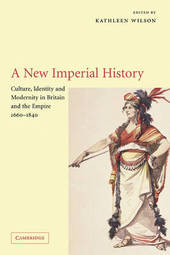
|
A New Imperial History: Culture, Identity and Modernity in Britain and the Empire, 1660-1840
Hardback
Main Details
Description
This pioneering collection of essays charts an exciting new field in British studies, 'the new imperial history'. Leading scholars from history, literature and cultural studies tackle problems of identity, modernity and difference in eighteenth-century Britain and the empire. They examine, from interdisciplinary perspectives, the reciprocal influences of empire and culture, the movements of peoples, practices and ideas effected by slavery, diaspora and British dominance, and ways in which subaltern, non-western and non-elite people shaped British power and knowledge. The essays move through Britain, America, India, Africa and the South Pacific in testament to the networks of people, commodities and entangled pasts forged by Britain's imperial adventures. Based on ground-breaking research, these analyses of the imperial dimensions of British culture and identities in global contexts will challenge the notion that empire was something that happened 'out there', and they demonstrate its long-lasting implications for British identity and everyday life.
Author Biography
Kathleen Wilson is Professor of History at the State University of New York, Stony Brook.
Reviews" A New Imperial History will appeal not only to scholars in British Imperial history, but also to an interdisciplinary audience. Scholars in other areas, such as women's studies, English and Asian literature, anthropology, and linguistics will find it enlightening as well." History "...this collection offers several stimulating starting points for further study and especially for comparative work with other imperial and colonial places." - William and Mary Quarterly, Allison Games, Georgetown University "There is a formulaic quality to the collection: one essay innovatively addressing race, class, and gender is followed by another daringly flouting hidebound convention in an exploratory study of class, gender, and race, and is followed in turn by a chapter fearlessly controverting orthodoxies on gender race, and class." The International History Review J.C.D. Clark, University of Kansas
|